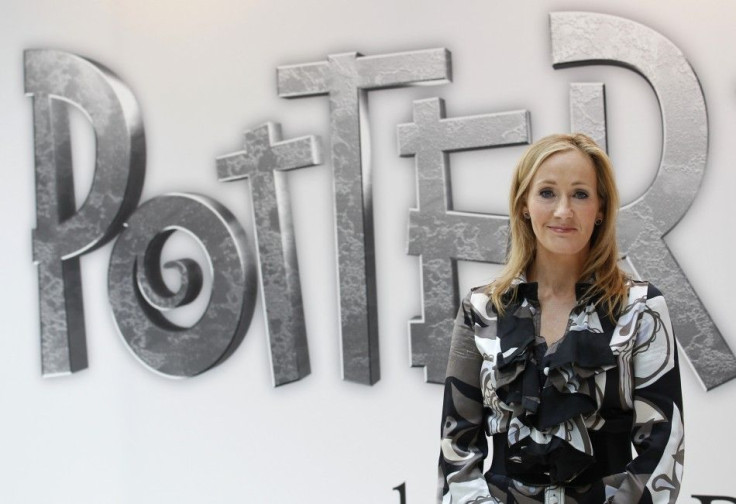J.K. Rowling e-books move threatens Amazon, traditional publishing
Move by blockbuster author threatens publishing structure

Traditional book publishing and retail has had a hard time the past two years, with many observers wondering if both are not headed down the same path that traditional music publishing and retail took -- a fast and difficult road to oblivion.
Harry Potter series author J.K. Rowling just sent a powerful message that the many observers may be right, and that it may happen quicker than many thought and be far more reaching than many assessed. The author of the famous children's book series announced she will release for the first time the Harry Potter works in e-book form.
Ordinarily, that would not be big news, an author releasing traditional books in e-book format. But Rowling is taking a different path, releasing and selling the books herself through a new website she named Pottermore. In other words, Rowling, one of the bestselling authors in the history of the world, is bypassing not just one traditional channel with her plan but two -- the publisher and the retailer.
Scholastic is the U.S. rights holder for the Harry Potter series but the company will receive royalties from sales of the book in U.S. editions from her. Also, Rowling will be bypassing leading e-book distributors Amazon and Barnes and Noble with the direct, do-it-herself model.
For an author with an audience, it's the ultimate wizardry.
I wanted to give something back to the fans that have followed Harry so devotedly over the years, and to bring the stories to a new digital generation, Rowling said. I hope fans and those new to Harry will have as much fun helping to shape Pottermore as I have.
All of Rowling's seven Harry Potter books will be released on Pottermore.com in the fall. She's even giving fans who buy the digital books direct from her site a magical treat -- 18,000 more words that will be distributed throughout the series. So it's not just the Harry Potter of old she's selling, but also the new and revised Harry Potter fans can find at Pottermore.com.
Traditional publishing and retail has already struggled to adjust to the fast shift from hardcover book sales to the new digital e-book realm but it's at least appeared for several years now that the players were positioned there. Amazon holds more than 50 percent of all e-book sales, while Barnes and Noble gets about 25 percent of the market and Sony 8 percent. But since book publishing is a business where a small percentage of many authors, the blockbuster writers like Rowling, John Grisham, James Patterson and Danielle Steele, command the vast majority of the sales volume, just a few defects creates a very big problem.
If Rowling makes a go publishing e-books herself, essentially bypassing both traditional means and new digital means trying to become traditional in recent years, more big authors are sure to follow -- meaning that the e-book market share held by Amazon, Barnes and Noble and Sony may have far less value than the companies and shareholders have argued and believed.
News of Rowling's e-book announcement, made Thursday on YouTube by the British author, follows a report earlier this week that Kentucky-based independent fiction author John Locke has become the second self-published author to sell a million books through Amazon's Kindle Direct Publishing program. Amanda Hocking, who writes vampire novels, became the first this year. She's since signed with a traditional publisher, but her success and Locke's success as self-published authors who couldn't get any attention at first from traditional publishers and built audiences quickly through Amazon's free Kindle Direct Publishing service by posting and selling their fiction works for 99 cents per copy to drive mass volume (they get about 35 cents per copy in royalties), begs a question.
How long before authors like Hocking and Locke follow Rowling's path and bolt, selling e-books through their own sites so they can keep the entire 99 cents? Also, how long will it be before all big authors previously with traditional keep digital rights and follow Rowling's path, selling e-books themselves to keep all of the money?
Maybe they don't need Random House, Amazon or Barnes and Noble if Rowling's plan works.
HIstory in the digital realm of content distribution and sales reveals that Rowling won't be the first big author to do it herself or the last, leaving big questions of relevancy regarding traditional publishers and new e-book publishing retail distributors like Amazon and Barnes and Noble. People may still want the devices they make and sell, including the Kindle and the Nook, but even those face stiff competition from Apple's iPad, still in its early revolutions.
Reality though is that Rowling is doing what all the players in the industry fear most -- taking the entire process directly to consumers all by herself. In her case, and for others who follow her path, that does not leave much room at all for those in the traditional publishing realm to make a business of it.
© Copyright IBTimes 2024. All rights reserved.











